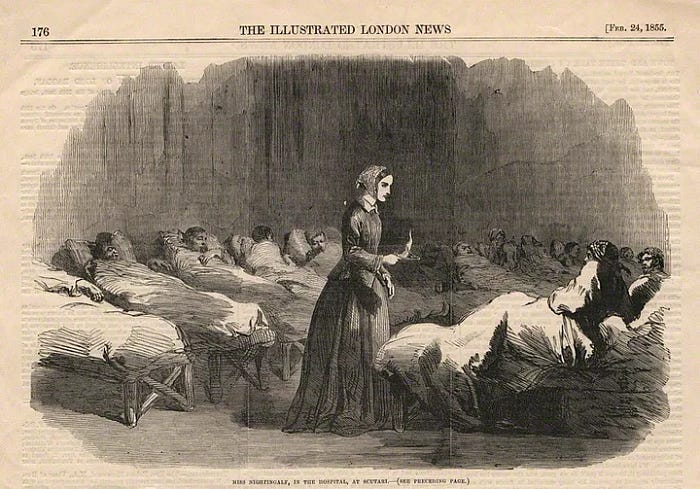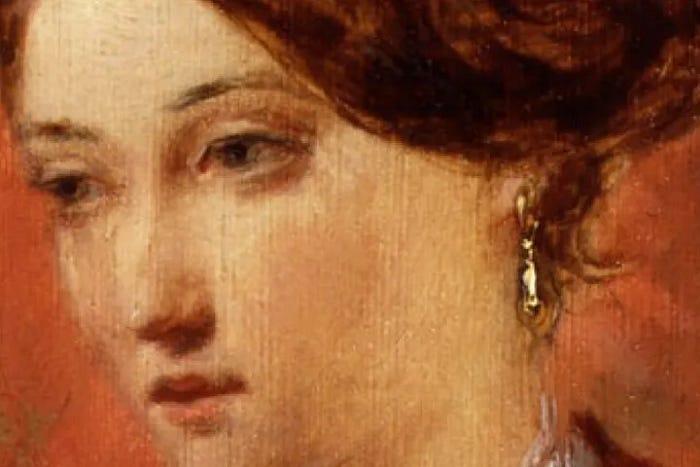She wouldn’t survive. She knew that, deep down in her bones.
Florence knew she couldn’t get married and live a life filled with the petty, boring duties of a housewife.
She had worked hard to stay independent. It was almost impossible to do that in a world where women were expected to marry.
But the suitors kept calling, and her family was pressuring her to choose a husband.
In Victorian society, women were expected to get married and raise a family. They weren’t expected to work outside of the home, and their education was limited to domestic skills.
An intelligent woman who wanted nothing to do with a traditional life was unheard of. They weren’t supposed to be ambitious, or driven, or want a career.
It was a very misogynistic time.
She’d almost lost it when Richard sent her the poem*:
My dearest love, my heart’s delight,
With you, I see my world is right,
For in your eyes, I find my peace,
And in your love, all worries cease.
I cannot imagine life without you,
For every moment is made anew,
With your sweet smile and gentle touch,
My heart’s desire, I love you so much.
So I ask you now, on bended knee,
Will you share your life with me?
In good times and bad, through thick and thin,
Together, we’ll face all that’s within.
My love, I promise to cherish you,
To hold you close and see you through,
All of life’s joys and all its sorrows,
Together, we’ll face each new tomorrow.
So please, my love, say that you’ll be mine,
That you’ll be my partner through all time,
And in your eyes, I’ll find my home,
Together, we’ll never be alone.
*by Richard Monckton Milnes, poet
(*In my imagination, not actually his poem)
He was the only man who could have won her. And he almost did.
Then she came to her senses and turned him down.
Florence Nightingale became a nurse instead

Her life was marked by her desire to effect social change and improve the lives of those around her. As a young woman, she was drawn to nursing as a profession.
At the time, nursing was seen as a low-status occupation and was often associated with poverty and marginalization. Nightingale was determined to break through these barriers and pursue her passion for nursing.
It was a perfect job for a woman who wanted to be left alone.
In 1851, she took nursing training in Germany, against her family’s wishes. When the Crimean War began, (1854), she answered a call for nurses.
She ended up in a horrible situation, in a dirty vermin-ridden hospital in Scutari with virtually no supplies. They were overwhelmed with wounded and dying soldiers. She focused on improving where she could, giving troops warm clothing and hearty food.
There were serious sanitation problems in the hospital, which she didn’t understand at first. Eventually, a British sanitary commission arrived at Scutari (1855). They cleaned out latrines and cesspits, flushed sewers, and cleaned up a polluted water supply. The number of deaths was greatly reduced.
After the war, she was affected by her experiences and suffered from a mysterious illness that left her bedridden for many years.
It may have been PTSD, combined with chronic fatigue syndrome. It’s also possible that she had a nervous breakdown, blaming herself for missing the obvious sanitation problems, costing many soldiers their lives.
Public health became her lifelong obsession.
She was a feminist, with a sharp tongue and little patience for bureaucracy
She was impatient with people, saving her compassion for sick or marginalized people.
She criticized doctors who weren’t willing to listen to her attempts to improve systems.
She irritated the commanding officers by going around them.
Her decision to become a nurse instead of marrying challenged the societal norms of her time.
She faced resistance and criticism from male physicians who were reluctant to accept her as a colleague. Nightingale’s struggle to gain recognition and respect from her male peers is an example of the larger societal issue of gender inequality and the marginalization of women’s contributions.
Nightingale’s work during the War and her subsequent advocacy for public health reform in Britain can be seen as part of a larger social movement toward improving the lives of women.
She recognized that the poor and marginalized members of society, including soldiers and the working class, were particularly vulnerable to disease and lack of access to healthcare.
Her efforts to reform nursing were motivated by her desire to help patients. Her advocacy for public health reform was an attempt to address systemic inequalities and improve the overall health and well-being of society.
She was one of the first feminist writers in history

Florence Nightingale is widely known as the founder of modern nursing, but she was also an accomplished writer and one of the first feminist writers in history.
Her novel “Cassandra” can be considered a feminist novel in several ways.
She describes life as a woman in Victorian society. They had limited opportunities for education, employment, and personal fulfillment.
The protagonist, Cassandra, is a talented and intelligent woman who is frustrated by the constraints placed upon her by her gender and class. She rebels against the traditional expectations placed upon her and seeks to live a meaningful life on her own terms.
The book was a revealing study of Nightingale’s own life.
Cassandra is a critique of patriarchal structures and gender norms. The book highlighted how her society valued women only for their beauty and domestic skills. At the same time, they were denied access to education and professional work.
She also critiqued the double standards in marriage, where women were expected to be faithful and obedient to their husbands, while men were allowed to pursue their desires freely.
Cassandra’s struggle for self-determination is a call for women to assert their independence and agency in a world that seeks to control and subjugate them. Nightingale’s novel is seen as an early example of feminist literature, as it raised important issues about women’s rights and gender equality that are still relevant today.
She used her writing to advocate for the rights of women, especially those in the nursing profession. In her book “Notes on Nursing,” Nightingale argued that women should be given access to education and training in healthcare, so they could be properly equipped to care for the sick and wounded.
Nightingale also wrote extensively about the unequal treatment of women in society, highlighting the need for equal rights and opportunities. She argued that women should be given the same opportunities as men in education, employment, and politics.
She could have had it all. A comfortable life in a large house with servants and family. But she chose to devote herself to a different life instead and made a substantial difference in the lives of many people.
Through her writing and activism, Nightingale paved the way for future generations of women to pursue their passions and challenge gender norms. She showed that women could be powerful advocates for change and played a crucial role in the fight for women’s rights.
Questions for you:
Do you have a dream of a life you wish you had lived? What would you rather be doing today?
If you had a nothing box in your head, what would you do with it?
What is the rabbit hole that you frequently fall into? 🐰🕳
Please answer in the comments below.
If you aren’t already a subscriber, consider joining the fun. ❤❤💕




